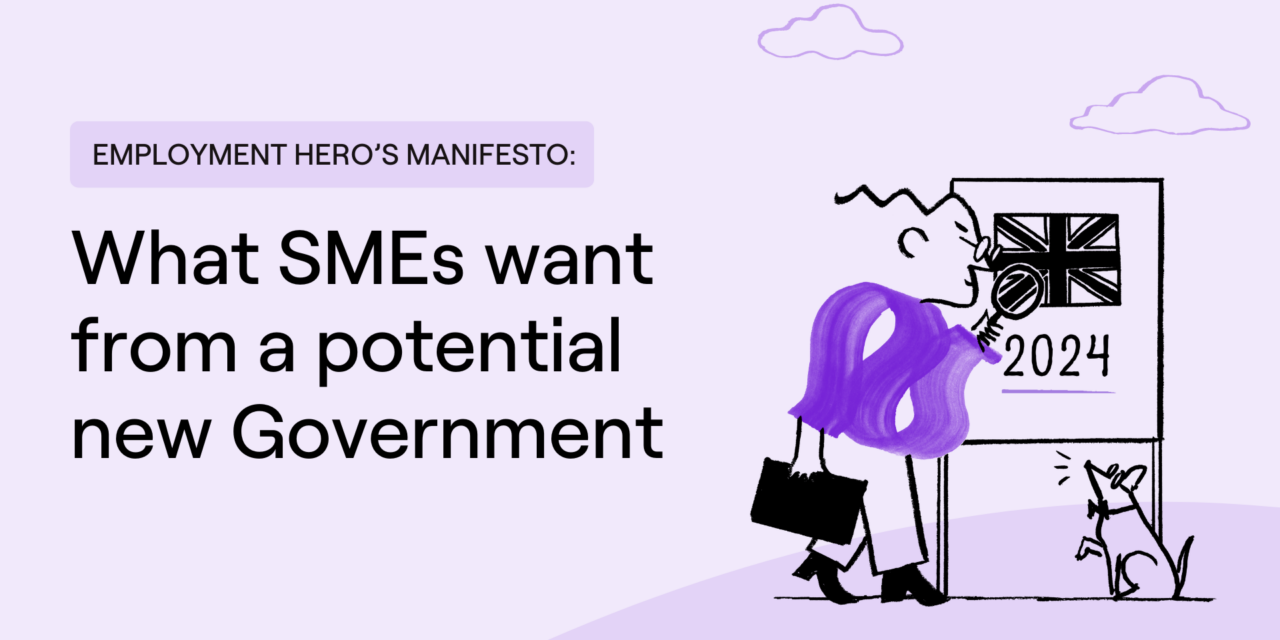As the dust settles from the surprise call for a General Election, small business owners are wondering what a potential new Government could look like and how it might directly impact them.
Elections are always a time of anxiety, especially for SME owners and employees who feel the brunt of policy changes. An Employment Hero survey conducted just before the New Year found that over a third (36%) of UK SMEs were bracing themselves for the potential repercussions of the upcoming general election on their
businesses.
The apprehension stemmed from a range of anticipated challenges that a new Government might bring:
42% of SMEs feared new policies that could disrupt their established business models.
42% were concerned about a governmental focus on short-term policies, potentially overlooking long-term business stability.
40% of businesses were wary of the potential for new costs being imposed on their operations.
26% anticipated facing more burdensome regulations, adding to the complexity of running their business.
Given that SMEs make up 99% of all businesses, contribute 50% of global GDP, and provide over 60% of all job opportunities, their concerns are significant for any Government aiming to secure support.
We’ve heard some murmurs from various parties, but we have yet to see any concrete commitments to support the growth and stability of our SME community. So, Employment Hero decided to write its own pledge.
Employment Hero’s Manifesto: What SMEs want from a potential new Government.
1. More investment in recruitment technology
All year, headlines have highlighted struggles in employment – unemployment rates are at an all-time high, job seekers can’t find work, and business owners can’t find the right talent. It’s a mess.
The Government must invest significantly in technology that enables easier, quicker, and more reliable recruitment. I speak to SME owners everyday and I know that they are disproportionately impacted by traditional recruitment processes – they can’t afford extortionate job ad fees, they don’t have the capacity to sift through hundreds of irrelevant CVs (an accepted byproduct of any job board) and they can’t wait weeks, sometimes even months, to fill a role.
AI is transforming the industry. Tools like SmartMatch, our talent and job matching tool, are revolutionising recruitment by using AI to match pre-vetted candidates to businesses. If we can solve recruitment for SMEs, then we can lift the handbrake that is currently stalling our economy.
2. Support for flexible work options
One thing that SME owners consistently tell me is that they struggle to compete with big businesses for talent. They often miss out on the best candidates because they don’t have the infrastructure to offer the same benefits packages. We know that remote and flexible work options are the number one perk UK employees want. Employment Hero data tells this story time and time again.
Despite this, there has been fear-mongering about returning to the office, with some businesses blaming poor productivity on reduced office hours. The data says otherwise: Employment Hero’s most recent Wellness at Work survey revealed that remote workers are the most productive in the UK.
Remote work allows SMEs to hire the best talent, regardless of location. It has the potential to completely transform business growth. We need more Government support for remote teams because this trend is here to stay.
3. Guidance and support for AI upskilling
As the AI revolution continues to take hold of the nation, SME owners are at risk of being left behind because they don’t have the funds to hire or upskill staff.
Despite Rishi’s pledge to make the UK a global AI leader, the reality paints a different picture. The business owners I speak to and the data I see indicates a persistent reluctance to implement AI and a deep-seated fear of its implications. Have we effectively communicated the benefits of AI to business owners and reassured employees about job security? Clearly not.
Last month, the Australian Government launched a $17 million AI adoption project, connecting businesses with AI expertise and offering SMEs free access to AI training and advice. This initiative is easily replicable and could help a potential new government gain the trust of UK SMEs.
4. Reduced regulation to accelerate growth
One of the most striking revelations from our survey last year was that 42% of SMEs are anxious about new policies disrupting their businesses. This isn’t a new story – red tape has been holding back SME growth for years. One of the biggest advantages of being an SME is agility, yet red tape erodes this advantage, so the ability to adapt and innovate is harder.
We need continued reform from the Government on upskilling staff with AI, investing in marginalised communities and founders, reducing costs and burdens on small business owners, and connecting young people with jobs and apprenticeships.
5. Addressing burnout in the workplace
Legislation like the ‘right to switch off’ represents a progressive step forward for worker rights in the UK, ensuring employees can maintain a healthy work-life balance. Our data shows that a staggering 64% of UK workers feel burned out at work. If we want productive teams, then reducing burnout should be a priority.
While primarily designed to protect employees from burnout and stress, the right to disconnect can also benefit SMEs – rather than worrying about potential drops in productivity, they should recognise that well-rested employees are more focused, creative, and efficient. Employment Hero experienced this first-hand; Australia (where a vast majority of our team are based) introduced the right to disconnect earlier this year. Despite working in several different time zones, our productivity hasn’t reduced, it’s improved.
Implementing clear communication policies and setting realistic expectations around working hours can help SMEs integrate legislation like this smoothly, but only if they have very clear guidelines to follow.
6. Better access to alternative finance
This year has been really tough for SMEs, who have struggled to access the finance they need to grow.
SMEs need new measures from the Government to improve accessibility to finance, particularly by raising awareness of alternative funding options. Nobody starts a business to deal with the admin of securing finance and employing staff. Instead of being rewarded for taking the plunge and deciding to do something extraordinary, SME owners are penalised for their entrepreneurial efforts.
Having spent the last decade living in Singapore, I know a lot about the SME experience in Asia. One thing that the Singapore Government did really well was introducing the Productivity Solutions Grant – SMEs can apply for the grant, which covers up to 50% of the expenses associated with adopting (pre-approved) IT solutions or equipment aimed at enhancing productivity.
SMEs are the backbone of the UK economy. Giving them easier and more competitive access to finance isn’t only fair; it’s crucial for pulling the UK out of this economic slump and creating a more prosperous environment for all.
As we approach the next election, it’s essential that any aspiring Government understands and addresses the unique challenges faced by SMEs. These businesses aren’t just economic entities; they are the lifeblood of our communities and a significant driver of innovation and employment.
By focusing on intelligent recruitment solutions, supporting flexible work arrangements, reducing regulatory burdens, upskilling the workforce and improving access to finance, a new Government can ensure a thriving SME sector that contributes to a robust and resilient economy.
Let’s make sure that the voices of SMEs are heard and their needs met. After all, their success is integral to the success of the entire nation.

Kevin Fitzgerald, is Managing Director, UK at HR, payroll and employee engagement platform Employment Hero.
Based in Ireland, Fitzgerald was previously MD of Asia for Employment Hero.
With over a decade of experience in tech, Fitzgerald will spearhead the Employment Hero platform's growth across the UK, focusing on supporting SMEs.
As a chartered accountant who previously led the growth of Xero as their MD in Asia, Fitzgerald brings sales and leadership experience from the tech industry, having worked on utilising technology to enhance the capabilities of employees. He has a deep understanding of the financial workings of a company as well as a passion for solving compliance-related issues for business.
Originally from Ireland, Fitzgerald has lived and worked in the UK, Australia, and Singapore. Before joining Employment Hero, he was Chief Revenue Officer at Spenmo, and he has also tenured with Pavilion and Robert Walters.






